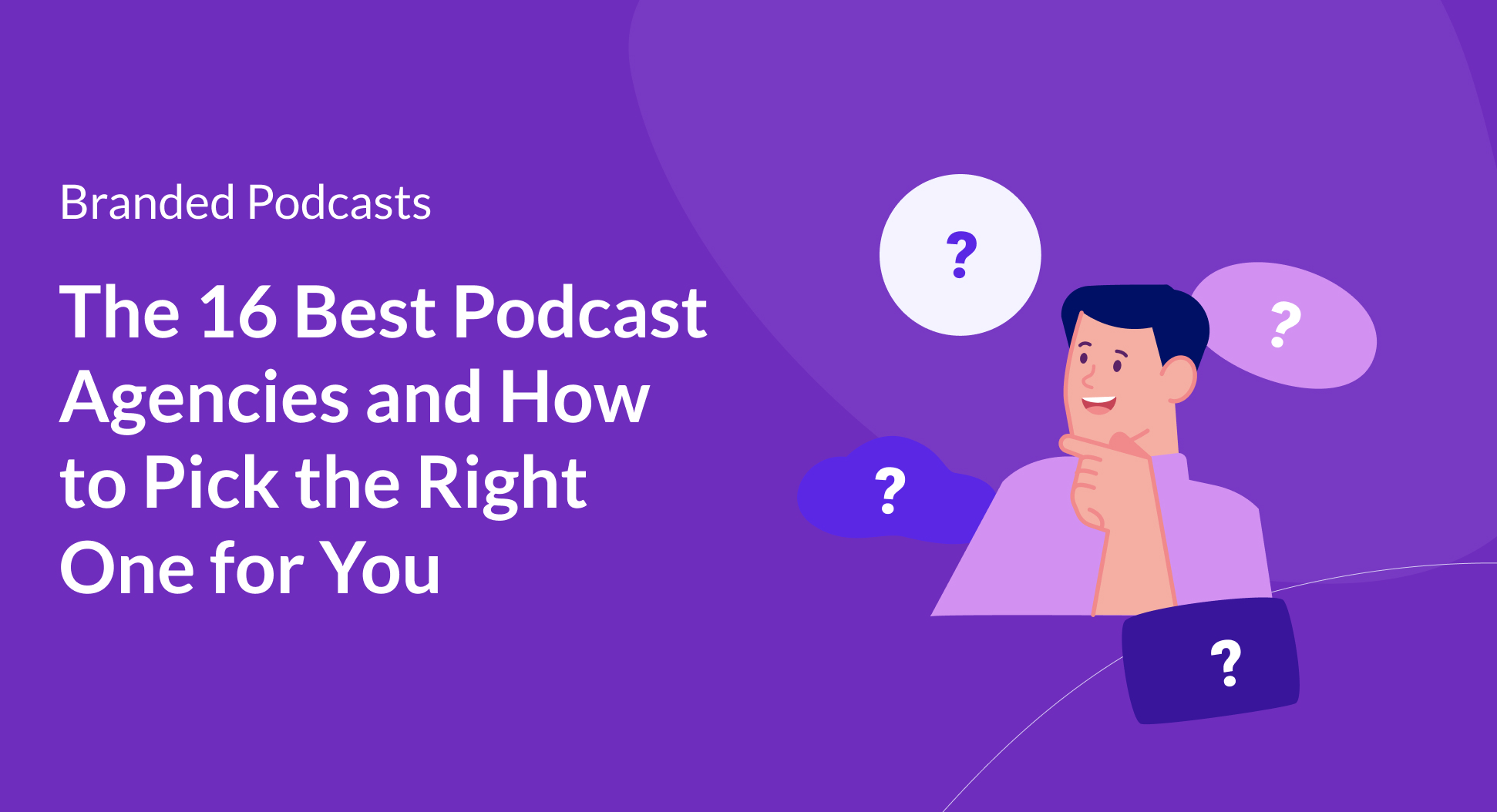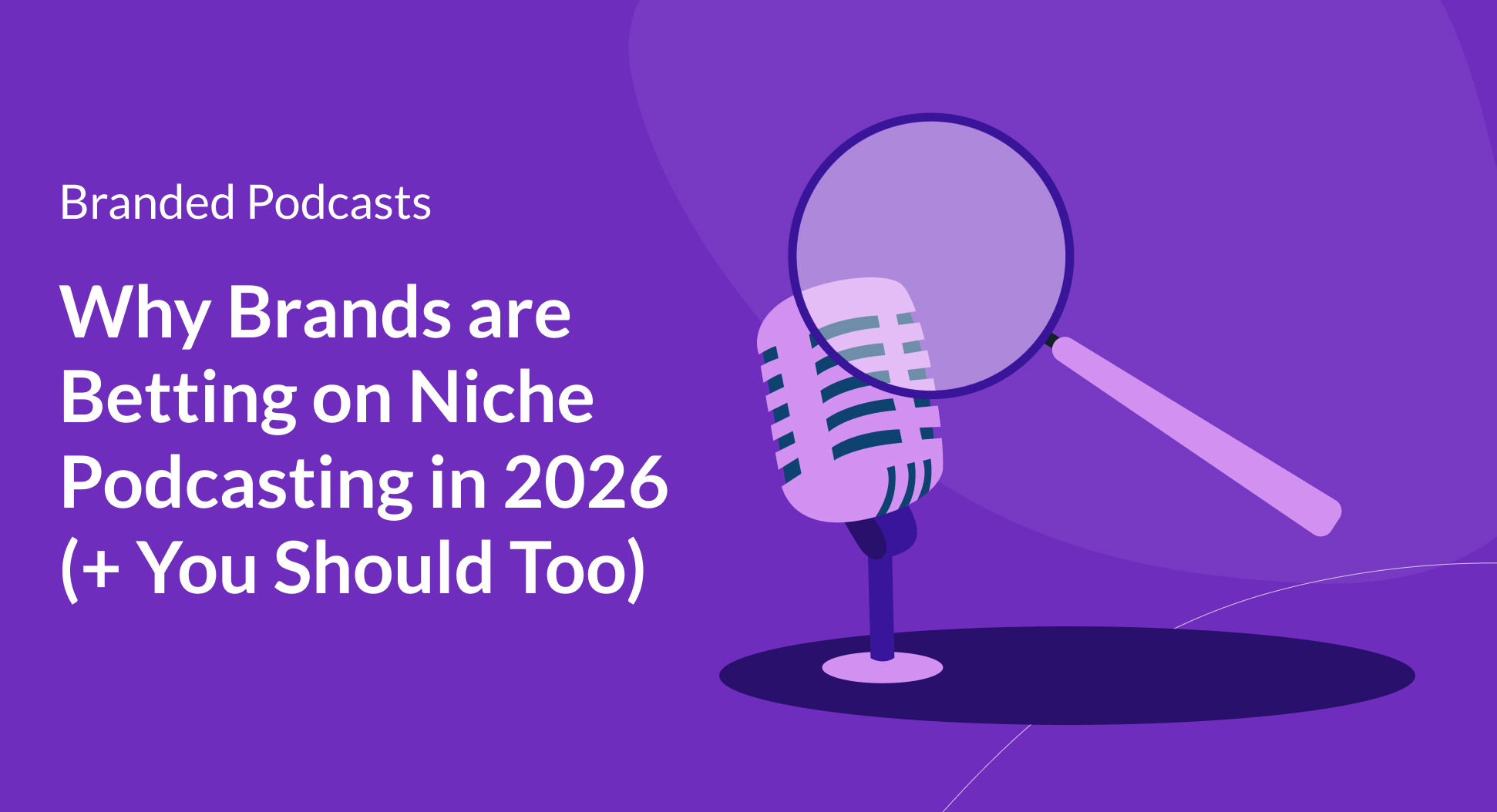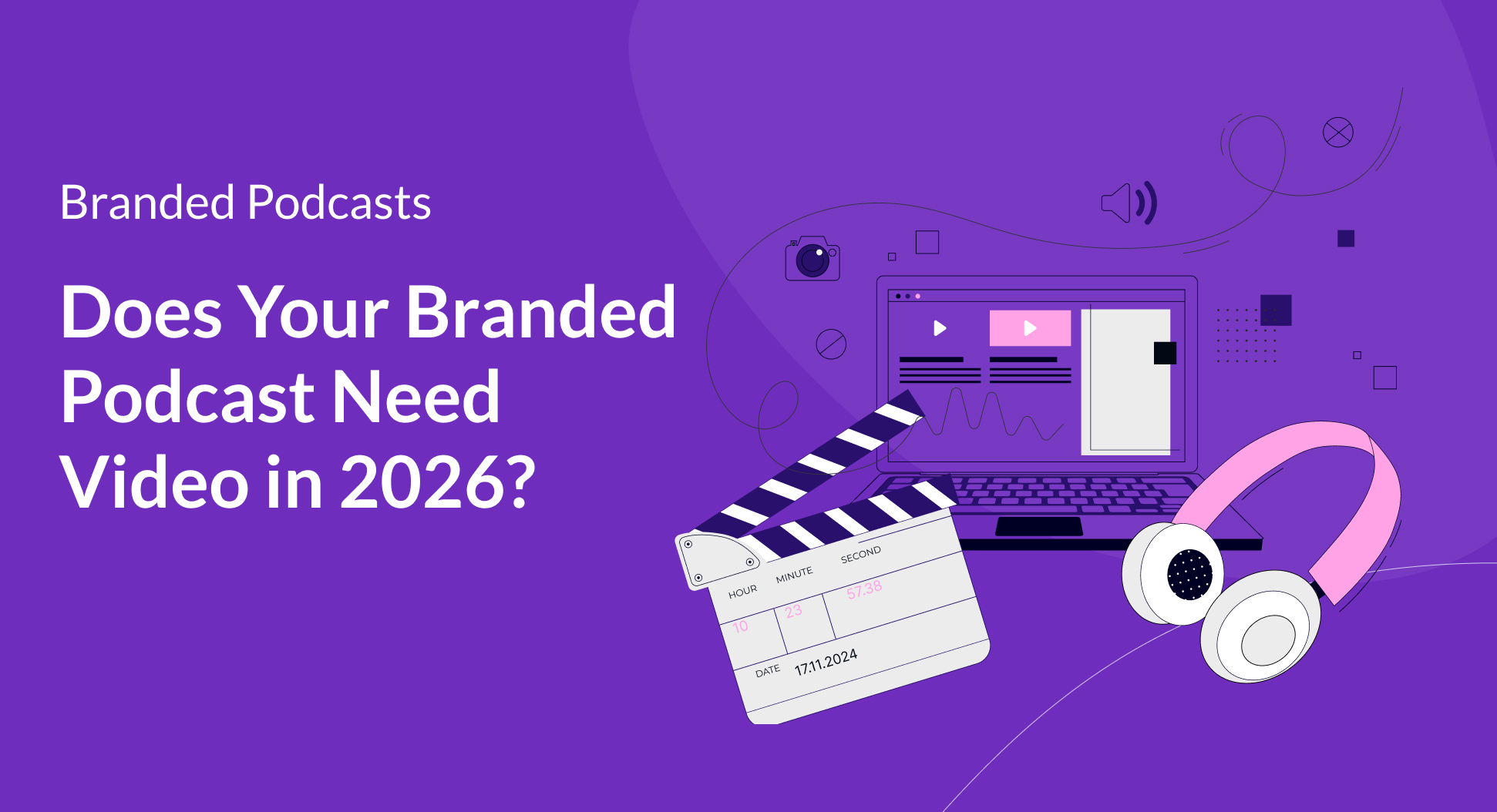Contents
We’d be lying to ourselves if we didn’t admit that there's a peculiar fascination with interviews that go awry.
All it takes is a quick YouTube search to find a repository of "interview fails" and "awkward interview moments."
It's a thrill to watch it all unravel when you're not in the hot seat. But when you find yourself on the interviewer's side, it's an entirely different story.
You quickly realize that while some interview mishaps are entirely beyond your control, many can be gracefully sidestepped through one crucial element: preparation.
Preparation is the linchpin of a successful branded podcast interview. It empowers you with structure, control, and a clear roadmap of key topics and subjects to explore.
In this blog, we'll walk you through five essential steps to ensure your guests are properly prepped and that your branded podcast interview is one to remember (for the right reasons).
P.S. Stay tuned to the end to learn how to keep your guests engaged post-interview.
1: Do your research
There’s nothing worse for a guest and listener than listening to the beginning of a podcast and it being hyper-clear that the host doesn’t have a good grasp on the guest or their experience.
Before your scheduled podcast interview, it's essential to get to know your guest and their work. This means conducting thorough research on their background, accomplishments, and areas of expertise to see how these fit into your podcast.
As a general rule, branded podcast guests should:
- Provide value to your listeners via expertise or experience
- Have an interesting and engaging story to tell
- Fit into your podcast’s niche
- Be trustworthy & credible
- Be comfortable and confident in interviews
Beyond independent research, we suggest making this step collaborative. Contact your guest in advance to see if there are any specific topics or promotions they'd like to highlight during the conversation or in their short bio.
And don’t be afraid to add your own stories with the guest. How did you meet them? Are there any quirky stories you have about them? Is there something personal you can relate to? Listeners (and guests) love this.
Quill tip: If you want to learn more about sourcing the right guests for your branded podcast, check out our complete guide here.
2: Brief your guest about your show
Send your guest a brief email explaining essential details about your podcast, such as its format, typical audience, the expected duration of the interview, and how you plan to promote the episode.
This information will help your guests become more familiar with who you are, what you do, and who your audience is, ultimately making them feel more comfortable during the interview.
If you’re working with an agency like Quill, our team would be looped in at this point to assist in briefing the guests and ensuring they’re comfortable, confident, and have everything they need before the recording.
3: Schedule a day and time
Scheduling might seem like a no-brainer, but it can quickly become a source of frustration if not handled efficiently.
To avoid any scheduling mishaps, consider using a calendar app, like Google Calendar, to streamline the process. This way, you can easily coordinate with your guest to find a suitable day and time for the interview, ensuring that both parties are on the same page.
Once you have settled on a date and time (be mindful of time zones!), send your guest a link to add to their digital calendar.
This calendar invite should have an overview of the podcast and what you’ll be chatting about, any relevant recording links for them to join, and a link to the interview questions (if you’re providing them beforehand which we don’t always recommend you do).
4: Provide technical guidance
Technical issues can derail an interview before it even begins, so it's crucial to provide your guest with detailed instructions on the technical aspects of the recording.
If you’re recording remotely, ensure that your guest is in a quiet space with good acoustics and can close a door for privacy if needed. Verify their internet connection to ensure compatibility with your recording software.
If you're not using remote recording software that captures both you and your guest, gather information about their recording equipment and show them how to use it effectively. But we encourage you to take advantage of good recording software before you go down another route.
Here's a quick checklist to help you prepare your recording setup:
- Microphones and headphones: Confirm that both microphones are correctly plugged in and functioning. Ensure that all participants have their headphones on, as this is crucial for monitoring audio quality during the interview.
- Mixer and software settings: Double-check all the mixer and software settings on your recording equipment. Ensure that your computer is set up to capture and record the sound accurately. This includes checking microphone input levels and audio routing.
By dedicating a few minutes to these checks, you can proactively address any technical issues and ensure a smooth podcast recording session. It's a small investment of time that can save you from potential disruptions and keep your podcast on track.
Again, if you’re working with a podcast agency, none of this will be on your plate. Your agency will be able to set up the recording and make sure the host and your guests sound the best they possibly can.
Quill tip: If you want to know the ins and outs of recording remote podcast interviews, check out our article which outlines all of the tips for creating a professional recording and explains four different recording options so you can find the one that best suits your needs.
Minimize distractions
While background noise is often inevitable, there are steps you can encourage your guests to take in advance to minimize distractions.
Before the interview, help your guest create an environment free of distractions. Ensure that you have no other commitments or tasks during the interview time. Lock your office door, silence your phone, and tend to any pets to prevent interruptions.
If you’re doing a video recording, encourage your guests to position themselves in front of a clean background in a well–lit room. This will help to keep your show looking professional and keep your audience’s focus on the speaker.
For the most part, background noise will be able to be cleaned up in post-production but we still recommend trying to avoid any unnecessary external noise.
5: Send podcast topics and sample questions in advance
To help your guests feel more at ease and better prepared, send them the podcast conversation topics and a few sample questions at least a week before the recording.
While these questions do not need to be nearly as in-depth as your podcast script, this information allows guests time to organize their thoughts and responses. The reason why we say a few sample questions versus all the interview questions is because you want the conversation to be as natural as possible. If you send all the questions prior, you risk having guests memorize their answers and come off a little more robotic.
You can also ask your guests for any related stories, which you can prompt them to share during the interview.
Engaging storytelling can significantly enhance your podcast content.
Here are some things to keep in mind when coming up with questions:
- Avoid basic yes/no questions that have no room for follow-up discussions
- Omit leading questions (questions that encourage a desired answer)
- Do not ask too many questions at once. Focus on one at a time.
When shaping your questions, always keep your audience at the forefront of your mind. What would your listeners find most compelling about your guest's story or insights?
You can even crowdsource some questions before the recording. Go online and ask your audience what they’d like to hear.
It's essential to strike a balance between serious and lighthearted questions and remember that the way your guest responds can lead the conversation in unexpected and exciting directions – so be prepared to ditch your script and go with the flow if needed.
Here's a breakdown of how to structure your branded podcast interview questions:
- Open-ended questions: Kick off the conversation with open-ended questions that encourage your guest to share their background and personal journey. These questions serve as an engaging starting point and help get the conversational juices flowing.
- Follow-up questions: Tailor your questions based on your guest's responses. Use follow-up questions to seek clarification, delve deeper into their points, or explore interesting avenues that arise during the conversation.
- Personal anecdotes: Humans are inherently drawn to stories. Encourage your guest to share personal anecdotes related to the topic at hand. These anecdotes humanize the conversation and make it more relatable and engaging for your listeners.
- Insight and advice questions: Remember that your primary goal is to extract thought-provoking insights from your guest. Craft questions that prompt them to share their unique perspectives and advice on the subject matter. These questions should encourage deep reflection and provide valuable takeaways for your audience.
“It’s often a good idea to schedule a pre-call with your guest before recording the interview. This will accomplish a few goals; you can establish a rapport with your guest, uncover topics you want to dig into that you may not have thought of, and allow the guest to ask any questions they may have. When you and your guest feel comfortable and prepared going into the interview, you’ll often find that your conversation flows much more smoothly.”
– Sarah Zandbergen, Producer @ Quill Inc.
6. Bonus: Making your guests feel comfortable
Prepping your branded podcast guests before an interview is essential to create a welcoming and comfortable atmosphere. When guests feel at ease and heard, they are more likely to open up, share valuable insights, and make your podcast episode truly engaging.
Here are a few ways to achieve this:
- Communicate clearly: Well in advance of the recording, provide guests with a clear outline of what to expect during the interview. Share the podcast's format, approximate duration, and any specific topics or questions you plan to cover. Encourage your guests to ask questions and seek clarification if they have any concerns. This open and transparent communication will help them mentally prepare and reduce stress.
- Offer a pre-interview chat: Sometimes, a short pre-interview chat can work wonders in establishing a rapport with your guests. A day or two before the recording, schedule a brief conversation to discuss the podcast's flow, answer any remaining questions, and just chat in a relaxed manner. This informal conversation can help break the ice and make your guests feel more at ease when the actual interview begins.
- Create a comfortable environment: Whether your podcast is recorded in a studio or remotely, pay attention to the environment. Ensure that the setup is comfortable and conducive to a successful interview. Use high-quality audio equipment, set up good lighting, and test all technology in advance. A comfortable physical environment can help your guests relax and focus on the conversation.
- Be a supportive host: During the podcast, your role as a host is not just to ask questions but to actively support your guests. Be an active listener, respond with empathy, and encourage your guests to share their insights and stories. Acknowledge their expertise and show appreciation for their contributions. Your attitude and behavior have a significant impact on your guests' comfort levels.
How to keep your guests engaged post-interview
Just because your interview has ended, doesn’t mean your connection with your guest should.
We highly recommend keeping in touch with your guests. At a minimum, you should send them a follow-up email right after the recording thanking them and covering how long the editing process will take and then another email after the episode has launched with a media kit including:
- Where they can listen to the episode
- How they can share the episode (tracking links)
- Graphics and social media copy to promote the episode with their network
Ultimately, your job as a host is to make your guest’s experience the best it can be – and that means the most streamlined.
Instead of simply encouraging them to share the episode with their network, make it as easy as possible for them to share by providing platform-specific social media copies and graphics.
Be your guests' favorite podcast host
By following these steps and adequately preparing your podcast guests, you'll not only increase the chances of having an engaging and successful interview but also build positive relationships with your guests.
Your network of podcast guests will not only return for future interviews but also become brand ambassadors, sharing their positive experiences and helping your podcast grow.
If you’re interested in learning more about podcast guest preparation, reach out to our team of audio experts.






.png)

.png)




.png)
.png)
.png)
.png)